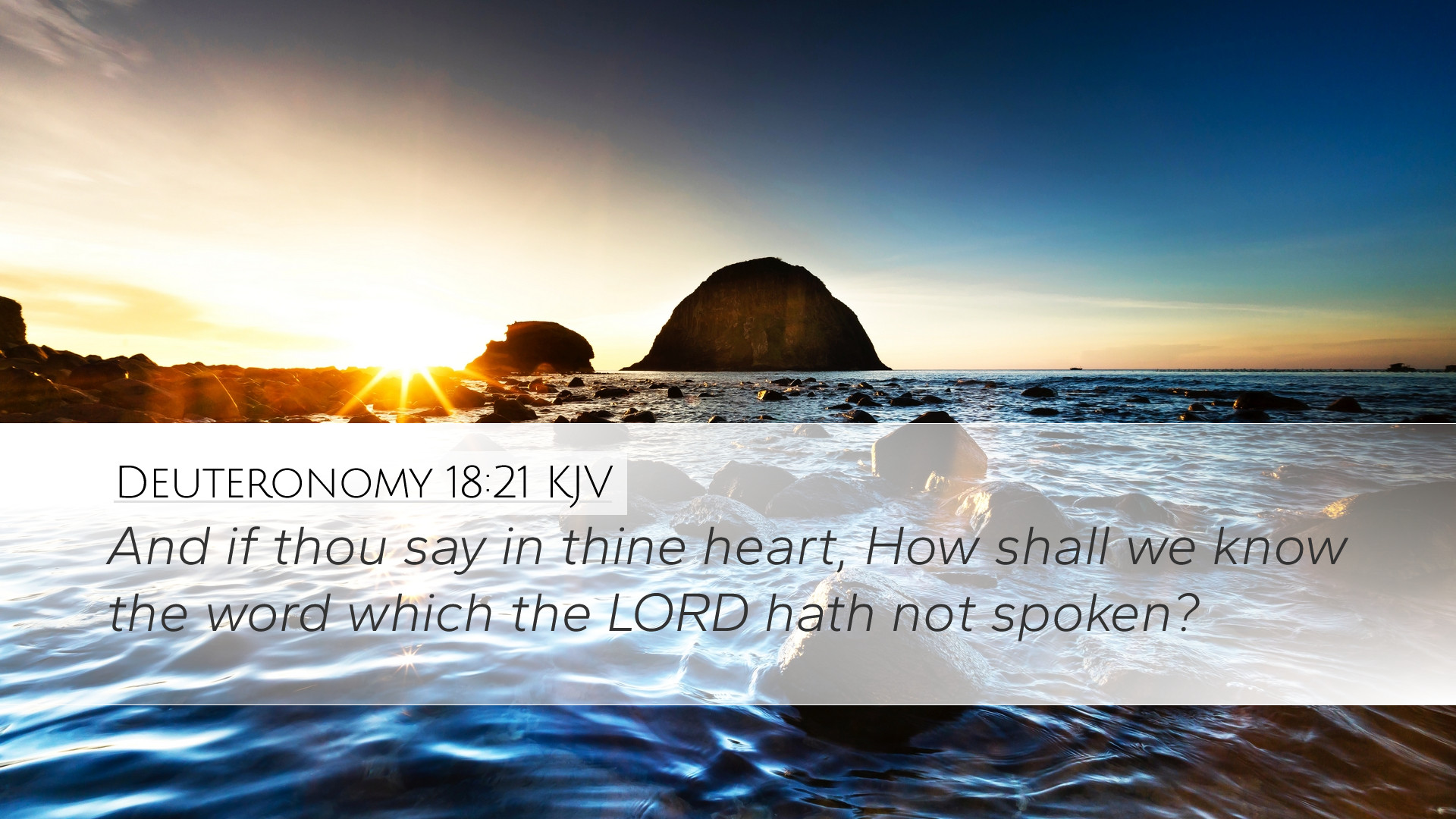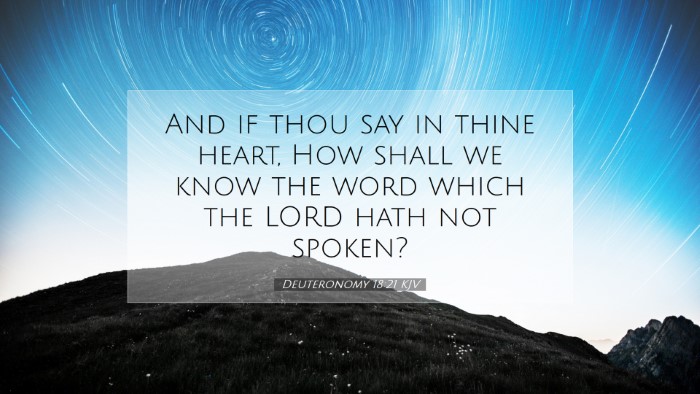Commentary on Deuteronomy 18:21
Verse Context: Deuteronomy 18:21 states, "And if you say in your heart, ‘How may we know the word that the Lord has not spoken?’" This verse occurs within a broader discourse on discernment, prophecy, and the expectations placed upon God's people regarding divine communication.
Introduction to Prophecy
In Deuteronomy 18, Moses provides crucial instructions about the office of the prophet. The insights provided by Matthew Henry, Adam Clarke, and Albert Barnes offer a rich tapestry for understanding the significance of prophecy within the Israelite community, emphasizing that recognizing true prophetic words is essential for spiritual integrity and communal faithfulness.
The Nature of Prophetic Revelation
As explored by Matthew Henry, the Israelites were to understand that prophecy is not merely an isolated phenomenon, but rather a vital aspect of God's ongoing relationship with His people. He notes that while individuals might question how to discern between true and false prophets, God assures His people through signs and characteristics inherent to His messenger.
Discernment of True Prophets
Adam Clarke expands on this theme by elaborating on the criteria for detecting false prophecies. He highlights the importance of consistency with previously revealed Scriptures and the faithful fulfillment of prophetic predictions as benchmarks for discerning authenticity.
- Authenticity of Fulfillment: Prophecies must be fulfilled as stated by the prophet.
- Consistency with God’s Word: True prophets will align with God’s previously revealed covenant and instructions.
- Edification and Encouragement: Genuine prophecy brings forth messages that lead to growth in faith and closer adherence to God's commands.
Caution Against False Prophets
Albert Barnes emphasizes a call to vigilance. In his view, the presence of false prophets is a historical constant; he draws attention to the necessity for believers to be anchored in God’s word so as not to be swayed by misleading teachings. The verse underscores a heart posture of inquiry, urging the Israelite community to actively seek the truth amidst the noise of conflicting voices.
Spiritual Consequences of Deception
Henry comments on the dire consequences of following false prophecies, reflecting the serious implications that erroneous beliefs could have on communal and individual spiritual well-being. The heart's inquiry, "How may we know the word that the Lord has not spoken?" serves as a critical gauge for avoiding spiritual deception.
Faithful Response to Prophetic Guidance
In light of the discourse surrounding prophecy, the expectation for the faithful community is to respond appropriately to genuine prophetic messages. Clarke mentions that the heart must remain open yet critically discerning, thereby promoting a culture of inquiry and reverence for God’s revealed will.
Empowerment Through Discernment
This call to discernment not only nurtures individual growth but empowers the corporate body to abide by God’s covenant. Believers are encouraged to humble themselves in prayer, study, and collaborative dialogue as they navigate the complexities of prophetic claims.
The Role of the Community in Discernment
The community of faith plays a vital role in discerning truth. Barnes notes the communal nature of prophecy; believers are urged to engage in conversation, uphold one another in faith, and collectively seek guidance through Scripture. This communal inquiry fosters both accountability and unity within the body of Christ.
Practical Application for Today
In contemporary settings, pastors and leaders are challenged to apply the lessons from Deuteronomy 18:21. They must create environments where questions are welcomed, Scripture is exalted, and individuals feel empowered to seek God’s discernment collectively.
Conclusion: A Call to Vigilance and Engagement
The insights drawn from the commentaries of Henry, Clarke, and Barnes illuminate Deuteronomy 18:21 as more than a directive; it is a clarion call for vigilance, engagement, and community within the faith journey. It reminds believers that discerning the voice of God is both a personal and communal endeavor, rooted in the truth of His Word.
Final Thought: As we seek to hear and understand the Lord's words today, let us remember the importance of discerning prophecies wisely, recognizing the weight of God’s communication through His chosen messengers and aligning ourselves closely with the truth of His covenant.


